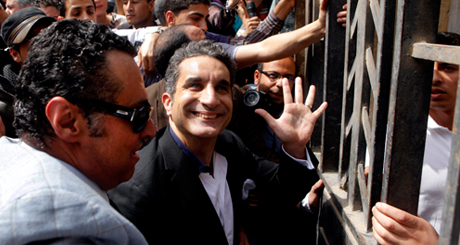 Popular satirist Bassem Youssef will be back to his weekly TV show after an almost three-month hiatus following the downfall of Egypt’s Islamist president Mohamed Morsi.
Popular satirist Bassem Youssef will be back to his weekly TV show after an almost three-month hiatus following the downfall of Egypt’s Islamist president Mohamed Morsi.
Youssef said on Wednesday his widely-viewed political satirical show, El-Bernameg (‘The Programme’), will be broadcast again in late October, defying the odds of an anticipated permanent halt to the show, which analysts say faces a tough challenge to provide political satire in the post-Morsi transitional phase of the turmoil-hit country.
“Sorry to disappoint fans of the rumour mill, we will be back on the same channel Friday 25 October,” Youssef said on his Twitter feed.
El-Bernameg, which is modeled on Jon Stewart’s The Daily Show in the US and broadcast on private TV channel CBC, was stopped after an episode in early July was cancelled amid political unrest in the wake of the ouster of Morsi. Youssef then announced a month-long break during the Islamic holy month of Ramadan, which fell in July this year.
A media advisor of El-Bernameg has said the interruption in broadcast, as well as a night-time curfew authorities imposed amid violence following the dispersal of Islamist sit-ins in mid-August, held back shooting of the show, which takes place at a downtown Cairo theatre with a live audience.
“Any other reports about problems with the channel or security-related matters are mere rumors,” Mohamed Fathy, El-Bernameg’s public relations advisor told Ahram Online.
In July TV comments, Youssef said his programme might resume by mid-August or September, plans that were further stalled by his mother’s death early in September, noted Fathy
Youssef’s absence since then, amid a deliberate period of silence from show insiders, has raised doubts about the future of the firebrand political satirist, with many speculating he might not be able to resume his political lampoon after Morsi’s fall, arguing that satirising the country’s interim leaders and the military which deposed him would not be an easy task.
Fathy however noted that Youssef presented 100 episodes of his debut show during the transitional military rule following the downfall of autocratic president Hosni Mubarak in 2011.
“At the time the situation wasn’t less critical and we did not know what was going to happen next, and he [Youssef] did not stop.”
“The team presents its viewpoint and do what they believe in regardless of the challenges,” Fathy added.
El-Bernameg, which has been a smash hit with 30 million Egyptian viewers, repeatedly mocked president Morsi and made witty parodies of him and other extremist Islamists. The show has been seen as highly instrumental in exposing the failings and transgressions of Morsi’s Muslim Brotherhood, making Youssef one of their formidable foes.
“It’s shameful and wrong for this type of programme to disappear just because the regime has fallen, and we do not have a president who delivers speeches or [Islamist] channels that make mistakes,” Youssef said in a TV interview in July.
He made it clear he realised it would be difficult to provide as “heated” content as before, amid lack of “dynamism” after authorities drove Islamists off the political scene following Morsi’s deposition. “We only have one side of political life now.”
Islamist-run TV stations were shut down in the immediate aftermath of Morsi’s removal on 3 July after mass protests against his turbulent year in power, and security forces have mounted a sustained crackdown on Islamists and their allies since.
During Morsi’s tenure, Youssef faced probes over alleged blasphemy and “insulting and undermining the standing” of the president, a case which fuelled fears about freedom of speech under Islamist rule.
Youssef, notwithstanding, strongly condemned a violent crackdown on Islamists when police moved in to disperse two pro-Morsi protest camps in Cairo on 14 August, leaving hundreds dead.
Despite his long absence, Youssef has regularly been writing his weekly article for Egyptian independent daily Al-Shorouk.
The 39 year-old cardiologist-cum-satirist shot to fame following the 2011 uprising that swept longtime autocrat Mubarak from power, releasing amateur videos online from his Cairo flat, which became an instant hit.
He was included in Time magazine’s 2013 list of the world’s 100 most influential people, with his entry in the list written by Stewart, who described the Egyptian as his “hero.”

